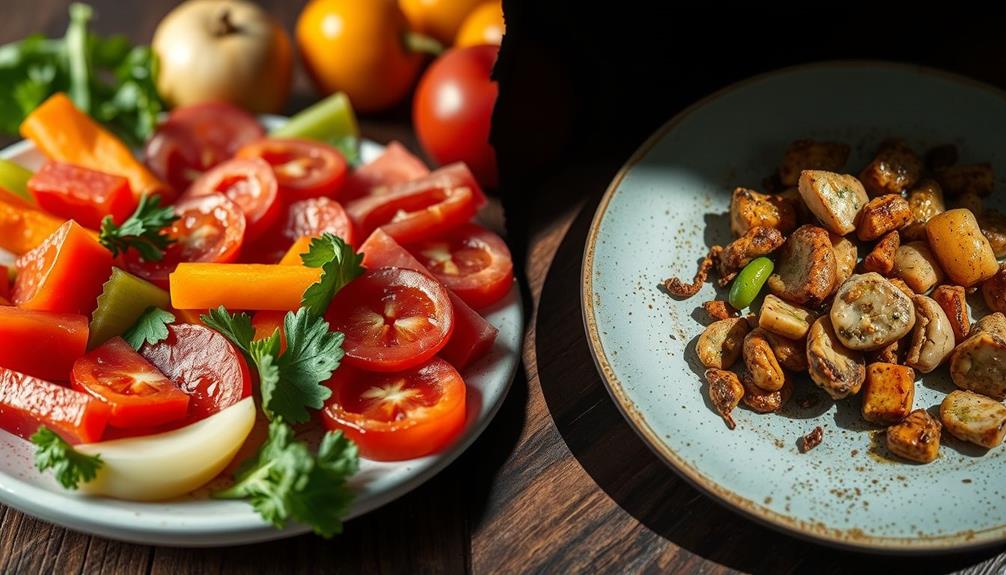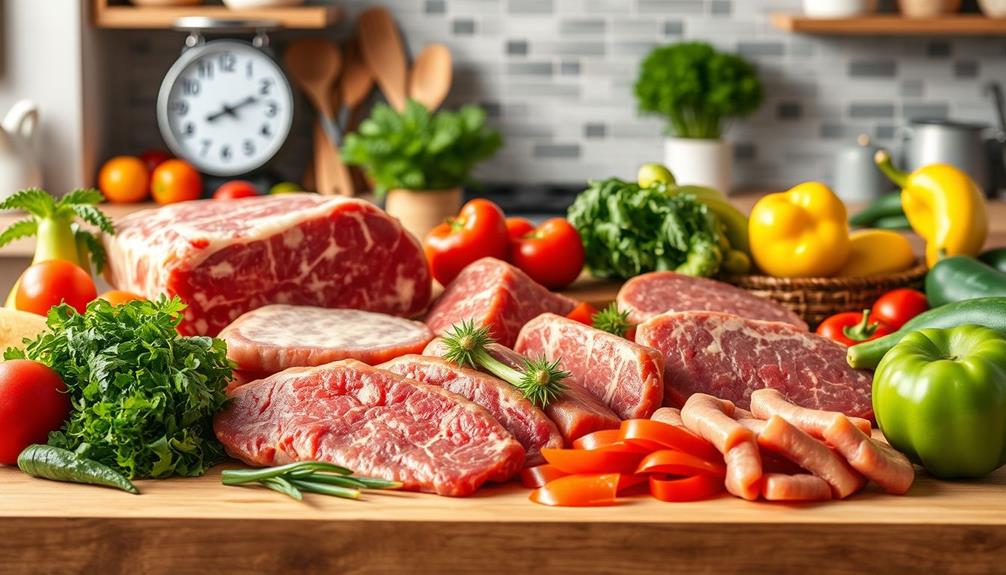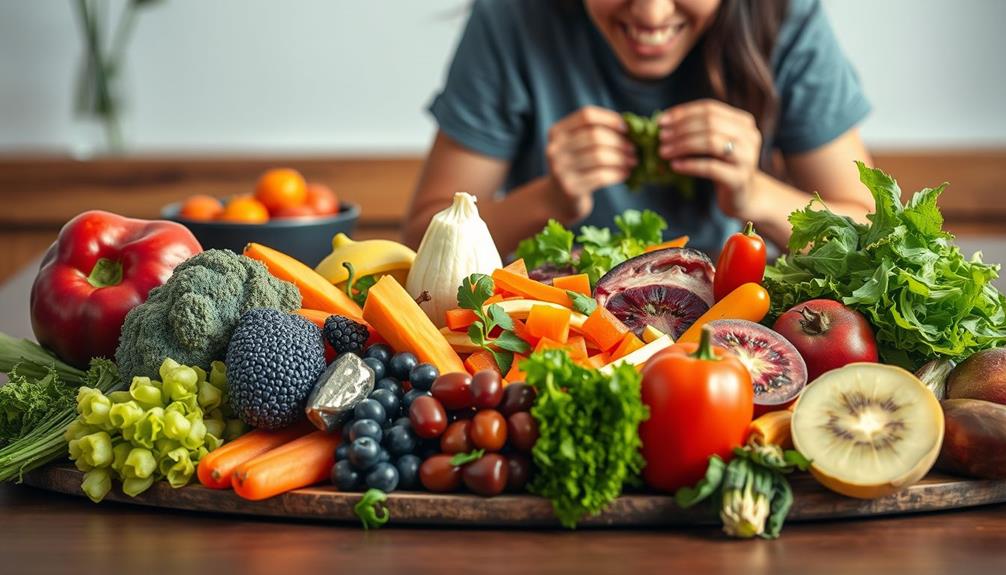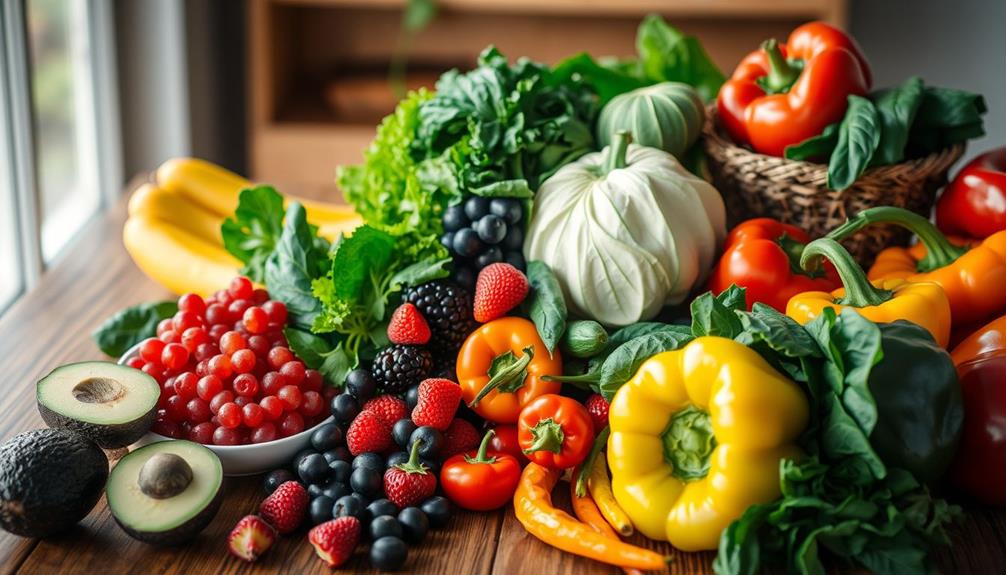Raw food diets might seem healthy, but they can pose several risks to your health. You could face nutrient deficiencies, especially in vitamins B12, D, iron, and zinc, leading to fatigue and immune issues. There's also a danger from bacterial contamination, particularly in raw eggs and seafood, which can cause severe illness. High fiber content may upset your digestive system, causing gas and bloating. Additionally, relying heavily on fruits can lead to dental problems. To avoid these risks and maintain well-being, it's vital to understand the implications and safe practices that come with such diets. Discover the deeper impacts on health.
Key Takeaways
- Raw food diets can lead to nutrient deficiencies, particularly in B12, D, iron, and zinc, impacting overall health.
- Consuming raw foods increases the risk of bacterial contamination, with pathogens like Salmonella and E. coli posing serious health threats.
- High fiber content in raw foods may cause digestive issues, including gas, bloating, and cramping, especially for those unaccustomed to such diets.
- Long-term adherence to raw food diets can result in decreased bone density due to insufficient calcium and vitamin D intake.
- Certain raw foods, like kidney beans and raw sprouts, contain toxins that can cause severe digestive problems if not properly prepared.
Overview of Raw Food Diets
In recent years, the raw food diet has gained popularity among health enthusiasts seeking to maximize their nutrient intake. This diet focuses on uncooked and unprocessed foods, primarily consisting of fruits, vegetables, nuts, seeds, and sprouted grains. Preparation methods often include blending, juicing, and dehydrating at temperatures below 118°F.
Variants of the raw food diet include the raw vegan diet, which excludes all animal products, as well as raw vegetarian and raw omnivorous diets, the latter incorporating raw animal products and meats. Many adherents believe that cooking depletes nutrients and enzymes, leading them to consume "live foods" thought to promote better health outcomes.
Additionally, certain raw foods, like beetroot, can pose risks if not consumed mindfully, as they contain oxalates that may cause throat irritation. While you might experience health benefits from increased fruits and vegetables in your diet, it's important to recognize potential nutrient deficiencies that can arise from strict adherence to a raw food diet.
For instance, if you don't plan your meals carefully, you could miss out on vital vitamins and minerals like vitamin B12, vitamin D, calcium, and iron. Limiting your food variety might impact your nutritional balance, increasing the risk of health issues related to inadequate nutrient intake.
Nutritional Deficiencies in Raw Diets

If you're considering a raw food diet, you need to be aware of potential nutrient shortages that can arise.
Many raw diets lack essential vitamins and minerals like B12, D, iron, and zinc, which are essential for your health.
Additionally, individuals following such diets may overlook the importance of hydration and proper nutrient intake, which is imperative for maintaining overall well-being, as highlighted in cold medications overview.
Without careful planning, you might also face protein deficits, leading to serious health issues over time.
Essential Nutrient Shortages
While many embrace raw vegan diets for their perceived health benefits, these diets often lead to important nutrient shortages that can have serious consequences. One major concern is vitamin B12 deficiency, which affects about 38% of raw food dieters. This deficiency can lead to severe neurological and cardiovascular issues.
In addition, without animal products, you may miss out on critical nutrients like iron, zinc, and omega-3 fatty acids, all fundamental for maintaining immune function, bone health, and cardiovascular well-being. Moreover, incorporating certain important oils, like eucalyptus oil, can support respiratory health, which may be compromised in those lacking proper nutrition.
Relying heavily on fruits can also skew your nutrient balance, resulting in excessive sugar and acidity, which can harm dental health. Important oils such as clove oil may offer some relief for dental pain, highlighting the significance of maintaining oral health.
In addition, inadequate protein intake is common in raw diets, as many plant-based sources don't provide all necessary amino acids. This can lead to muscle loss and impaired bodily functions.
If you stick to a raw vegan diet long-term without proper supplementation, you could face serious health risks, including developmental issues in children and reproductive health concerns, like amenorrhea and infertility in women.
Considering these important nutrient shortages, it's essential to assess whether a raw diet meets your nutritional needs.
Protein and Vitamin Deficits
Adopting a raw vegan diet can considerably impact your protein and vitamin intake, often leading to vital deficiencies. Many plant-based sources don't provide adequate amounts of all essential amino acids, especially if you're excluding legumes and nuts. This can result in protein deficiencies, which may affect muscle mass and overall health.
Additionally, it's essential to recognize that raw foods can enhance nutrient absorption due to minimal processing, but this doesn't compensate for the potential lack of essential nutrients in a raw vegan diet supporting digestive health.
Vitamin B12 is another significant concern, as it's primarily found in animal products. Studies indicate that up to 38% of raw food dieters show low levels of this vitamin, which can lead to serious neurological issues.
Additionally, iron absorption can be negatively affected by anti-nutrients present in many raw plant foods, increasing the risk of anemia.
You might also experience low vitamin D levels since it's mainly obtained from animal sources or fortified foods, potentially leading to bone health problems.
Moreover, raw diets often lack sufficient zinc, as you're likely avoiding meat and dairy. Low zinc levels can result in immune dysfunction and other health complications.
Food Safety Risks
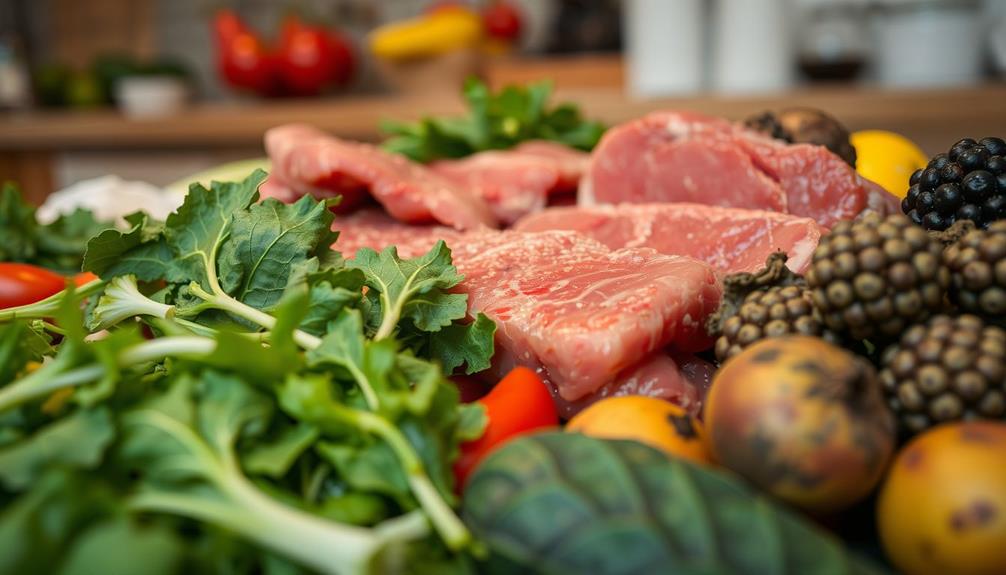
When you choose to consume raw foods, it's crucial to be aware of the food safety risks that come with them. While raw diets can be appealing, they also carry potential dangers that can lead to food poisoning.
For instance, many pet owners might take into account raw diets for their animals without understanding the risks involved; similarly, humans may underestimate the safety of certain raw foods, as highlighted in safe snacks for hamsters.
Here are some key risks to keep in mind:
- Raw Eggs: Consuming raw eggs can expose you to Salmonella, a bacteria that can cause severe gastrointestinal illness.
- Raw Oysters: These may harbor harmful bacteria and viruses, leading to vibriosis, which can result in serious health issues.
- Raw Kidney Beans: If not cooked properly, they contain toxins that can cause nausea and vomiting.
- Sprouted Foods: These can be contaminated with harmful bacteria, underscoring the importance of proper washing and handling.
To maintain your food safety, always practice safe food handling techniques.
Thoroughly wash fruits and vegetables, avoid raw animal products when possible, and cook foods like pork to a safe internal temperature.
Being mindful of these risks can help you enjoy raw foods without compromising your health.
Toxic Raw Foods
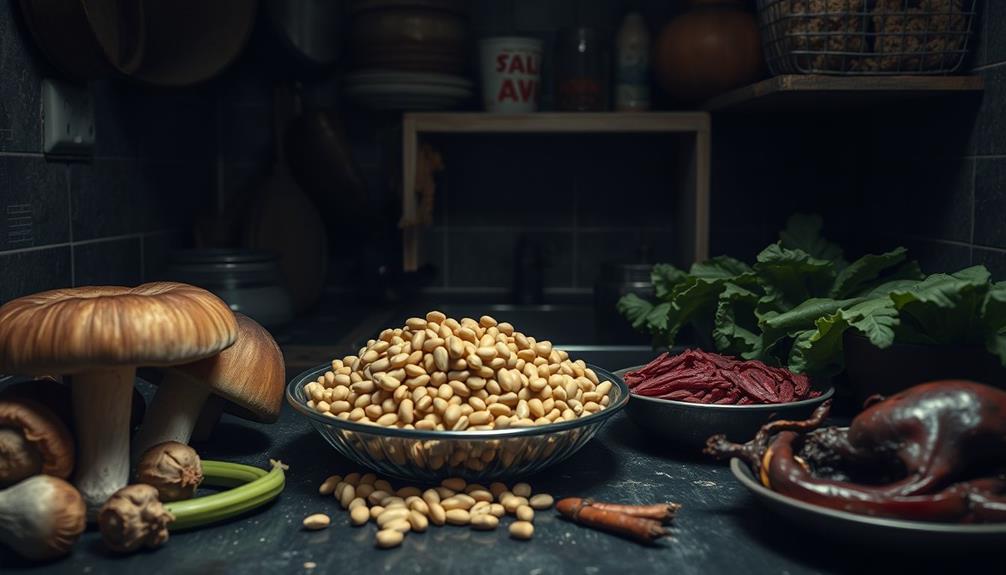
Consuming certain raw foods can pose serious health risks due to toxic compounds that remain active without proper cooking. For instance, kidney beans contain phytohaemagglutinin, which can lead to nausea and digestive issues when eaten raw. Similarly, cassava holds cyanogenic glycosides that can cause cyanide poisoning if not cooked thoroughly.
Rhubarb leaves are another example; they are highly toxic due to their oxalic acid content, which can damage your kidneys. Even raw apricot kernels pose dangers, as they contain amygdalin that converts to cyanide in your body, risking fatal consequences. In addition, raw sprouts, like alfalfa and bean sprouts, can harbor harmful bacteria, increasing your risk of foodborne illness.
Here's a quick overview of some toxic raw foods:
| Food Item | Toxic Compound |
|---|---|
| Kidney Beans | Phytohaemagglutinin |
| Cassava | Cyanogenic Glycosides |
| Raw Apricot Kernels | Amygdalin (cyanide risk) |
To stay safe, always confirm you're cooking these foods properly to neutralize their toxic compounds. Your health depends on it!
Bacterial Contamination Concerns
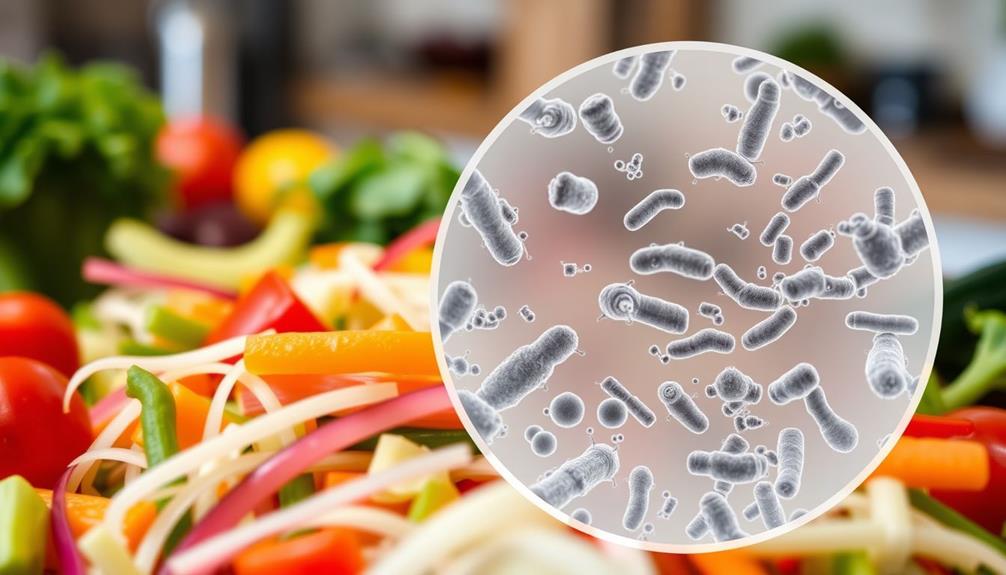
When you choose to eat raw foods, you're putting yourself at risk for bacterial contamination, especially with high-risk items like sushi and oysters.
Consuming raw foods can also make it difficult to detect the presence of harmful pathogens, which often require cooking to eliminate breast cancer symptoms.
It's essential to be aware of common pathogens like Salmonella and E. coli that can thrive in these foods.
Practicing safe food handling and storage can help minimize your chances of foodborne illness.
Common Bacterial Pathogens
Many people may not realize the risks associated with consuming raw foods, especially animal products. Raw foods can harbor harmful bacteria that lead to serious health issues. Individuals with certain mental health disorders, like Borderline Personality Disorder, may also struggle with impulsive behaviors, including risky eating habits.
Here are some common bacterial pathogens you should be aware of:
- Salmonella: Often found in raw eggs and raw meat, this bacterium can cause severe gastrointestinal illness.
- E. coli: This pathogen is frequently linked to raw sprouts and undercooked beef, potentially leading to severe stomach cramps and diarrhea.
- Campylobacter: Typically present in unpasteurized dairy products, it can result in food poisoning with symptoms like fever and cramping.
- Listeria: This bacterium can thrive in raw seafood and unpasteurized dairy, posing a significant risk to pregnant women and those with weakened immune systems.
Consuming raw eggs carries a risk, with about 1 in 20,000 eggs potentially contaminated with Salmonella.
Additionally, unpasteurized dairy and raw seafood also present significant dangers. Being aware of these pathogens can help you make safer food choices and avoid potential health risks associated with raw foods.
High-Risk Foods
High-risk foods pose significant bacterial contamination concerns that can jeopardize your health. Consuming raw animal products, like sushi and oysters, often exposes you to harmful bacteria such as E. coli and Salmonella, increasing your risk of food poisoning.
Raw eggs are another concern; they can harbor Salmonella, so it's vital to cook eggs until both the white and yolk are firm. Additionally, it's essential to guarantee that your pets have safe chewing options, as some raw foods can also be harmful to them, just like certain high-risk human foods can be detrimental to dog health.
Healthy dog snacks promote overall wellness and should be prioritized in their diet.
Moreover, raw or undercooked pork can lead to infections from Salmonella and listeria, making it necessary to cook pork to a minimum internal temperature of 145°F. Dishes like ceviche, which contain raw seafood marinated in citrus juice, also present risks. To eliminate these dangers, seafood should be cooked to at least 145°F.
Don't overlook sprouts, either. Often consumed raw, they can carry harmful bacteria like E. coli and Salmonella.
These high-risk foods highlight the importance of being aware of what you're eating. By understanding the risks associated with raw foods, you can make informed choices that protect your health and reduce the chances of food poisoning.
Always remember, when in doubt, cook it!
Safe Food Handling
Safe food handling is crucial for preventing bacterial contamination and ensuring your health. When it comes to raw animal products, the risks are considerable. You can reduce the risk of food poisoning by following these key practices: Regularly checking and cleaning your kitchen appliances can also help maintain a safe cooking environment, much like ensuring your air purifier is well-maintained for better air quality air purifier maintenance tips.
- Wash fruits and vegetables thoroughly under running water before consumption.
- Cook meats to safe minimum temperatures, ensuring they're free from harmful bacteria.
- Store raw eggs and sprouts properly, purchasing from reputable suppliers to limit contamination.
- Stay informed about food safety regulations, including safe cooking guidelines.
High-risk groups, like children, pregnant women, and immunocompromised individuals, should be especially cautious with raw foods.
Contaminants like Salmonella and E. coli can lead to severe illnesses if proper measures aren't taken. By implementing these safe food handling techniques, you can considerably lower the risk of bacterial contamination and protect yourself and your loved ones from foodborne illnesses.
Digestive Issues From Raw Foods

When incorporating raw foods into your diet, you might encounter some digestive challenges. The high fiber content in raw vegetables can lead to digestive issues like gas, bloating, and cramping, especially if you're not used to a high-fiber diet. This can be particularly problematic for those who haven't established a solid budget for healthy eating and may find themselves overwhelmed by the new dietary changes.
Cruciferous vegetables, such as broccoli and cauliflower, contain anti-nutrients that may inhibit digestion and cause gastrointestinal discomfort.
Raw beans, particularly kidney beans, pose another risk. These beans contain toxins like lectins that can lead to severe digestive problems if consumed without cooking. As you adapt to a raw food diet, your digestive system may struggle to adjust to the sudden increase in raw fruits and vegetables, resulting in temporary disturbances.
Additionally, consuming raw foods heightens the risk of foodborne illnesses. Harmful bacteria present in these foods can lead to gastrointestinal infections, causing symptoms like diarrhea and vomiting.
To minimize these risks, it's important to introduce raw foods gradually, ensuring your body can adapt without overwhelming your digestive system. Always wash fruits and vegetables thoroughly and consider cooking certain items to avoid potential digestive complications.
Long-Term Health Effects

When you stick to a raw food diet long-term, you might face some serious nutrient deficiencies that can impact your health.
This restrictive eating can also lead to concerns like weakened bone mass and digestive issues over time.
It's essential to understand these risks to make informed choices about your nutrition.
Nutrient Deficiencies Over Time
Adopting a raw food diet can initially seem like a healthy choice, but over time, it often leads to significant nutrient deficiencies that can jeopardize your long-term health.
Many essential nutrients are primarily found in animal products, making it challenging to meet your body's needs. Here are four key concerns to take into account:
- Vitamin B12 Deficiency: A study shows that 38% of raw food dieters lack adequate vitamin B12, risking serious health issues like neurological complications and mood changes.
- Iron Deficiency: Without sufficient iron from meat sources, you may experience fatigue and decreased immunity.
- Reproductive Health Issues: About 30% of women under 45 may face amenorrhea after three years on a raw food diet due to insufficient caloric intake.
- Dental Problems: High fruit consumption can lead to dental issues from acidity and sugar content.
To combat these nutrient deficiencies, supplementation is often necessary, but relying on supplements raises concerns about the sustainability of a raw food diet.
Ultimately, it's vital to evaluate whether this lifestyle truly supports your long-term health.
Digestive Health Concerns
Raw food diets can lead to significant digestive health concerns that may not be immediately apparent. The high fiber content of raw foods can cause gas, cramping, and bloating, complicating your digestive health. Additionally, some raw vegetables contain anti-nutrients that hinder nutrient absorption, creating further issues.
Certain foods, like kidney beans and cassava, contain toxins that can induce severe digestive distress if not prepared properly. Long-term adherence to a raw food diet can also result in insufficient calorie intake, leading to unintentional weight loss and potential malnutrition. This lack of diversity in food sources may compromise gut health and increase the risk of gastrointestinal disorders.
Here's a table summarizing these concerns:
| Concern | Description | Potential Outcome |
|---|---|---|
| High Fiber Content | Causes gas, cramping, and bloating | Discomfort and digestive distress |
| Anti-nutrients | Hinders nutrient absorption | Nutrient deficiencies |
| Insufficient Calorie Intake | Leads to weight loss and malnutrition | Compromised overall health |
| Toxins in Raw Foods | Requires proper preparation | Severe digestive distress |
Considering these factors is vital for maintaining your long-term digestive health.
Bone Mass Risks
Many individuals following a raw food diet often overlook the potential long-term risks to their bone mass.
Research shows that a strict raw food diet can lead to lower bone density over time, increasing the risk of osteoporosis. Without sufficient calcium and vitamin D, your bones may suffer greatly.
Here are some key risks to take into account:
- Nutrient Deficiencies: Raw diets often lack essential nutrients, particularly calcium and vitamin D, vital for building and maintaining bone mass.
- Hormonal Imbalances: Inadequate caloric intake can disrupt hormonal balance, further harming your bone density.
- Decreased Bone Density: Studies indicate that raw food vegetarians exhibit markedly lower bone mass compared to those with varied diets.
- Increased Osteoporosis Risk: Over time, the combination of low nutrient intake and poor bone mass can elevate your risk of developing osteoporosis.
To mitigate these risks, monitoring and careful planning of your nutrient intake is essential.
Ensuring you get enough calcium and vitamin D can help protect your bone health and overall well-being.
Impact on Bone Health
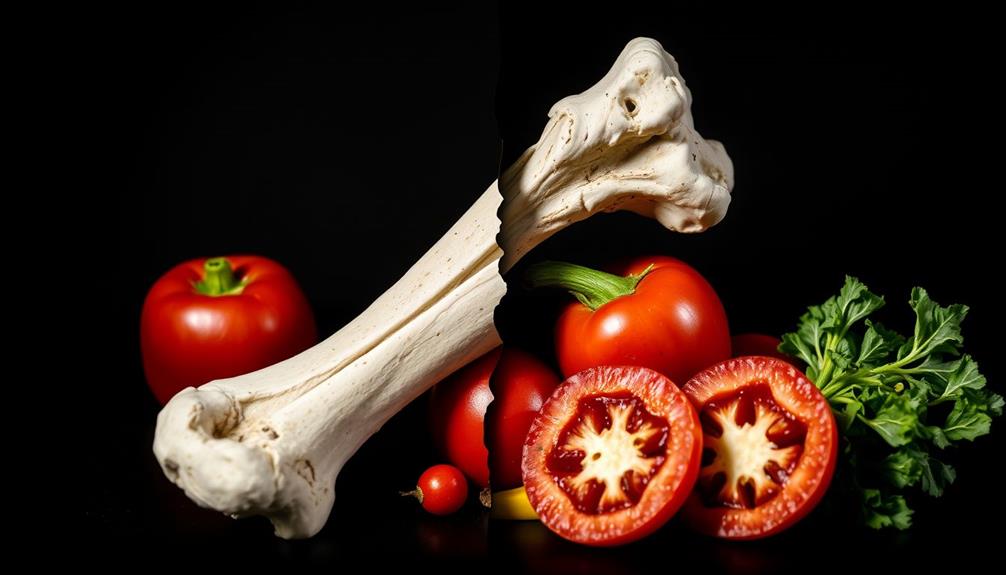
The impact of a raw food diet on bone health can be significant and concerning. If you're following a strict raw food diet, you might be at risk for deficiencies in essential nutrients like calcium and vitamin D, which are vital for maintaining strong bones. Studies show that people on a raw vegan diet often have lower calcium levels, increasing their risk of osteoporosis.
Here's a breakdown of key factors affecting bone health on a raw food diet:
| Nutrient | Impact on Bone Health |
|---|---|
| Calcium | Essential for bone density |
| Vitamin D | Helps absorb calcium |
| Homocysteine | High levels can increase fragility |
| Amenorrhea | Hormonal changes reduce density |
Without adequate calcium intake, the recommended daily amount of around 1,000 mg for adults goes unmet. Additionally, nutritional imbalances can elevate homocysteine levels, further jeopardizing your bone health. If women experience amenorrhea while on this diet, this can lead to further hormonal imbalances, compounding the risk of osteoporosis. It's essential to take these factors into account if you're committed to a raw food lifestyle.
Risks of Raw Animal Products
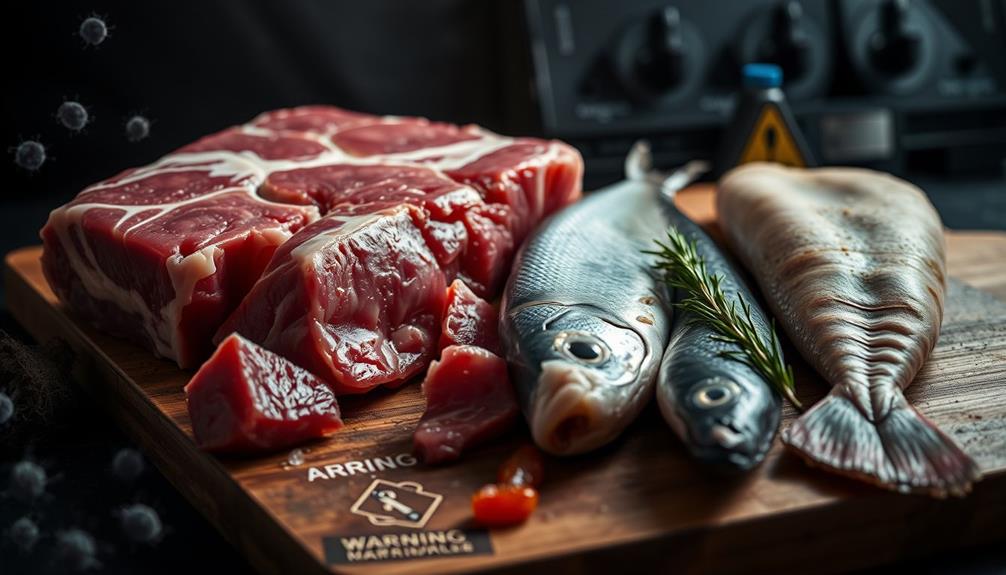
Consuming animal products without cooking them can expose you to serious health risks. Raw animal products, including sushi, oysters, and ceviche, can harbor harmful bacteria and parasites that lead to foodborne illnesses.
Here are four major risks you should be aware of:
- Salmonella: Found in raw eggs and undercooked pork, this bacteria can cause severe gastrointestinal distress.
- Vibriosis: Raw oysters may carry this bacteria, potentially leading to serious illnesses.
- Anisakiasis: This parasite can be present in raw seafood, causing vomiting and diarrhea, particularly in vulnerable populations like children and pregnant women.
- E. coli: Undercooked meat can harbor this bacteria, leading to severe health complications.
It's essential to understand that eating raw animal products increases your risk of these foodborne illnesses.
You should always cook animal products to safe temperatures to reduce these health risks.
Best Practices for Safety

Ensuring safety while enjoying raw foods requires a few key practices to minimize health risks. First, always thoroughly wash all fruits and vegetables before consumption. This simple step helps remove harmful bacteria and pesticide residues that can lead to food poisoning.
Additionally, consider cooking methods, like steaming or boiling, for certain raw foods, as they can considerably reduce harmful bacteria and toxins.
Be cautious about the plants you consume. Avoid known toxic parts, such as rhubarb leaves, which contain harmful compounds that can cause severe health issues.
It's also essential to educate yourself about proper food storage practices. Keeping raw foods stored correctly helps prevent spoilage and reduces the risk of food poisoning.
Lastly, when introducing new raw foods into your diet, monitor for food allergies or sensitivities. Some individuals may have adverse reactions, so it's vital to be aware of how your body responds.
Frequently Asked Questions
What Are the Risks of Eating Raw Food?
Eating raw food can expose you to nutrient deficiencies, toxins, and harmful bacteria. You might experience dental issues, gastrointestinal discomfort, and long-term reproductive health risks if you rely solely on uncooked diets without proper variety.
What Are the Dangers of Eating Raw?
Did you know that 1 in 6 Americans gets sick from foodborne illnesses each year? Eating raw food can expose you to harmful bacteria, parasites, and toxins, leading to serious health risks you might not expect.
What Is the Risk Factor in Raw Food?
When you eat raw food, you risk exposure to harmful bacteria and toxins. These can lead to foodborne illnesses and nutrient deficiencies, potentially causing long-term health issues if you don't plan your diet carefully. It’s important to be aware of the risks of raw food and take necessary precautions to minimize them. This can include properly cleaning and preparing raw fruits and vegetables, as well as being cautious about consuming raw animal products. By understanding the risks of raw food and making informed choices, you can still enjoy the benefits of a raw food diet while protecting your health.
Why Is Raw Meat a High Risk Food?
Raw meat's a high-risk food because it can contain harmful bacteria like Salmonella and E. coli. When you don't cook it properly, you increase your chances of serious foodborne illnesses and health complications.
Conclusion
In the quest for health, going raw might seem like a great idea, but it can come with serious risks. From nutritional deficiencies to food safety concerns, the drawbacks often outweigh the benefits. Remember, not everything that glitters is gold. It's essential to strike a balance in your diet, ensuring you get all the nutrients your body needs while minimizing health threats. Stay informed, choose wisely, and enjoy your food without compromising your well-being.

